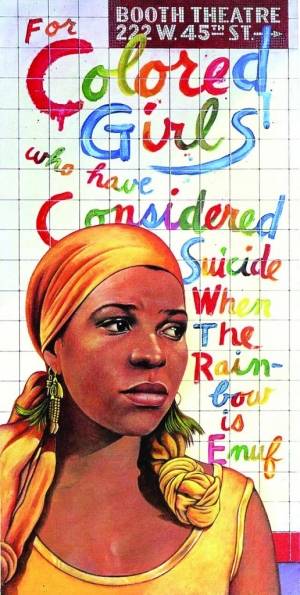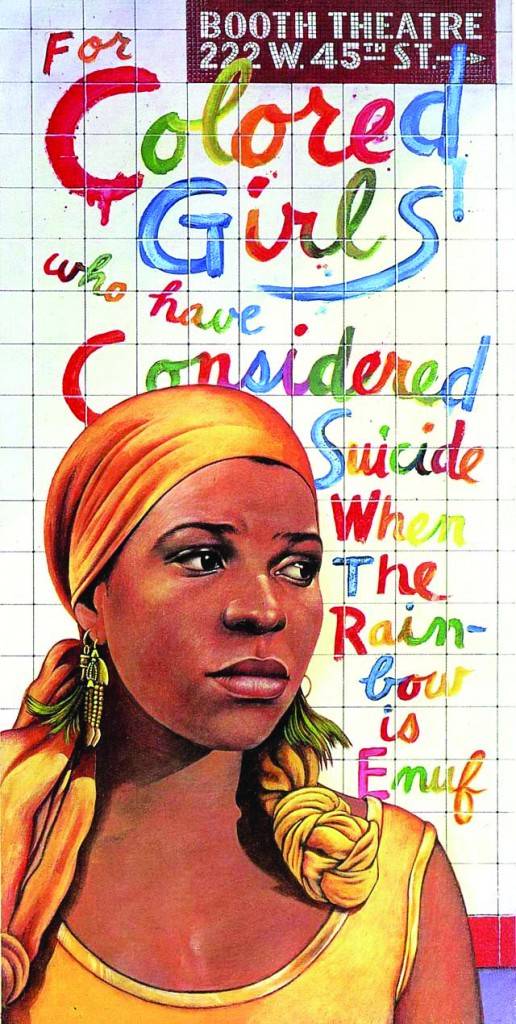Twin City Squared is a theatre company that has been vocal about providing opportunities for both performers and audiences who may not always be targeted by the usual fare of Champaign-Urbana productions. True to that mission, they are bringing the Obie award-winning play For Colored Girls Who Have Considered Suicide / When the Rainbow Is Enuf to the stage this weekend. A series of dramatic poems intended as monologues, Shange’s work focuses on the trials and triumphs of minority women as they go about the difficult work of living. Bringing different cultural perspectives to light and framing experiences realistically, this play speaks to everyone on a human level.
 Although the poet coined the phrase “choreopoem” for the original staging of this work, its fluid format loans itself to myriad interpretations. Even the casting is flexible, as every woman on stage is known only by the color she wears: “Lady in Brown”, “Lady in Red”, etc. The number of players and the poems they perform, with or without coordinated movement, is entirely decided per production. The staging we will be treated to this weekend is to be in the round, with six women in predominantly warm hues.
Although the poet coined the phrase “choreopoem” for the original staging of this work, its fluid format loans itself to myriad interpretations. Even the casting is flexible, as every woman on stage is known only by the color she wears: “Lady in Brown”, “Lady in Red”, etc. The number of players and the poems they perform, with or without coordinated movement, is entirely decided per production. The staging we will be treated to this weekend is to be in the round, with six women in predominantly warm hues.
Co-directors Garth Gersten and Tanisha Pyron, as well as cast member Cessily Thomas were kind enough to speak with me regarding their interpretations of the work.
Smile Politely: What made you choose this particular play?
Garth Gersten: To me, this is an important play. It is a strong play. It is a human play. It speaks and gives voice to what was unsaid in 1975 and, too often, is still unsaid. That is why, in the first poem, “the Lady In Brown” exhorts us to “sing a black girl’s song.” This play affected me deeply when I first heard and saw pieces of the show when I was in college. It may have been the first time I saw a room full of people openly crying and sobbing at a theatre performance. It was then and still is an eye-opener. […] It is a landmark of American theatre — and any lover of drama should have an opportunity to see it live.
However, I recognized my own limitations, and that is why Tanisha Pyron is a co-director. She has performed and directed this play before.
Tanisha Pyron: I reached out to Garth about auditioning via video submission as I was booked in a regional production with Curious Theatre in Denver, Colorado and he said yes. He cast me as “the Lady in Red” and we when he saw that I had directed this play twice previously, he asked if I would be interested in coming on board as a co-director as well.
SP: While universal human cruelty is at times unavoidable, do you have personal experiences with domestic violence, misogyny, racism, or other of this play’s issues that helped you create the realm and themes for this production?
Gersten: In my legal career, I have met with and represented women faced with difficult issues. That has helped. Also, I spent one on one time with each woman in the cast, talking and exploring the ideas in their particular poems – and their lives. They were able to bring to their performances their own experiences and experiences of their friends, families and acquaintances. All I and my co-director Tanisha Pyron had to do was gently coax and guide these women to integrate those experiences with the words in the play. I had the cast meet one evening just to talk to each other about the poems and their lives – without me present. One member of the cast is performing one of the “No More Love Poems” series which she says is her life story. But, this play is not just about human cruelty – there are moments and poems that speak to and of the wonder of the human soul. There are moments about perseverance and discovery. Yes, some pieces are hard, even devastating. But, I find the ending positive and uplifting as the women are determined to live their lives having found within themselves strength and identity.
SP: What has been your favorite part of directing this production?
Pyron: The ladies. Every time I come at this particular play I glean so much about the style of the production from the ladies themselves. Every cast brings its own energy to the room, so it has been great seeing them engage this material. And of course working with Garth. He has such a passion and excitement that he brings to the work, an expansive mind and a real love for theatre and bringing diverse stories to the C-U community. I am having a blast adding my vision and experience with the play to the mix and my perspective as a woman of color. I think cross-cultural collaborations add much to the creative process in general and I look forward to creating with this dynamic group of women and Garth and Twin City again soon.
SP: What were some of the challenges you faced while developing your “Lady”?
Taylor: My character, “the Lady in Brown”, is “preachy”, at times kid-like, and Afrocentric…that’s exactly who I am. My biggest challenge was learning the lines with a 4 month old baby, 1 year old and an 11 year old running around the house. My second biggest challenge was figuring out how my poem fit in the grand scheme of this work. The other ladies’ have poems that deal with serious, life changing, hurtful issues and mine deals with none of those. So I found that a bit challenging.
SP: Even with Tanisha’s considerable dance experience, the choice for this production has been to omit the “choreo” from the “choreopoem”. Can you speak to what factors led to this decision, and how you feel it has affected the production?
Gersten: Simply, we have chosen to concentrate on the words. The audience will be close to the actors, and it will be as if the actors are speaking directly to audience members. I felt that having too much deliberate choreography — and staging — would restrict the actors’ ability to make those audience connections. I wanted the stories — the poems — to feel and look natural. Although, there has been a fair amount of reminding the actors to turn to face all directions when performing. It is a poor analogy — but the staging is sort of like a large group therapy session.
Pyron: We made the decision due to the limited rehearsal schedule and to play to the strengths of the dynamically beautiful women we cast, as none identified as dancers. We didn’t make it a central point of the production but don’t be surprised if you see movement in the final production as we are still making great discoveries every single rehearsal.
SP: What do you hope a viewer would take away from attending this performance?
Taylor: I hope viewers leave with a sense of hope and renewed strength to carry on even when life throws it’s “best punch” at you! This work reminds me of the lyrics of one of my favorite gospel songs “It won’t always be like this, the Lord will perfect what’s concerning me. Sooner or later, it’ll turn in my favor… It’s turning around for me” That’s the message I get from this, and the message I hope people who come to see it get as well.
Gersten: Ntozake Shange’s words have such power — but also magic. The rhythms of the poems reach out and carry you into the stories being told. It sweeps me up so readily that I feel the poems sometimes more than hearing the actual words. So much so, that in directing this play, I have discovered more brilliance in the poems than I remembered, because I remembered the feelings more than the actual words. I hope audiences come away with that sense of having “felt” the poems.
For Colored Girls… will be performed Friday and Saturday, January 22nd & 23rd at 7 p.m. with matinee performances at 2 p.m. on Saturday and Sunday, January 23rd & 24th, on Parkland Theatre’s Second Stage. Tickets are $12 apiece, or a 4-pack is available for $45, and can be purchased online or at the door. The production company would like you to be aware that the play contains language which may be considered offensive or objectionable as well as themes which may be considered inappropriate for persons under the age of 16.








